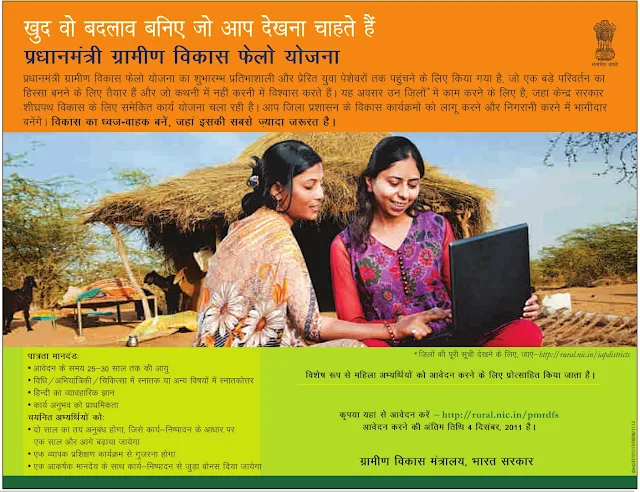An opportunity to lead transformational change - Introducing the Prime Minister's Rural Development Fellows Scheme
Scheme Overview
PMRDF is an excellent opportunity in the development sector that will provide exceptional growth potential.
To be Eligible:
- Must be 25-30 years old
- Must be a postgraduate in Social Science/ Science/ Management or a graduate in Law/ Engineering/ Medicine
- Knowledge of hindi and a local language used in an IAP district is desirable.
- Work experiemce is preferred
Key dates 2011
Last date for Submitting Applications: Dec 4th Shortlisted candidates will be announced: Dec 23rd
Last date for Submitting Applications: Dec 4th Shortlisted candidates will be announced: Dec 23rd
APPLY NOW TO BE A FELLOW VISIT http://pmrdfs.tiss.edu/apply-now.php
Training
The selected candidates will go through a three-month intensive training course including a 4 week internship in the preferred district.
Duration of Posting:
The fellows will be appointed for a period of two years on a fixed contract, extendable for one more year based on performance. The PMRDF will be offered an attractive compensation that would include HRA, health insurance and other support.
It is envisaged that the selection and training process and intensive development facilitation work at the village, block and district level as PMRDF will provide an exceptional growth potential.
PMRDF is an excellent opportunity for the committed young people to contribute to enhancing development and welfare of the people in rural and tribal areas of the country.
PMRDFs will basically function as development facilitators, they will assist the Collector and his/her colleagues in each of the IAP districts and provide them with the necessary analysis of situations and how they should be handled.
The fellows would actively pursue a district programming approach following three key strategies given below:
Strengthen the district resource base for programming by finding ways of resourcing all the planned activities and rational budgeting.
Establish or strengthen systems by exploring alternative ways of delivering services to reach the most deprived communities.
Trigger processes which would support the changes that have been envisioned in this approach (e.g. village planning).
This would be complemented by a set of supportive actions such as building the capacity of district and block officials; triggering district-wide social mobilization processes particularly among the youth; achieve a ground swell of support and build strong relationships with the Panchayats.
✍ Share Your Knowledge with Our Community!
get rewards for paying bills
upto ₹250 off when you pay your first bill on CRED

